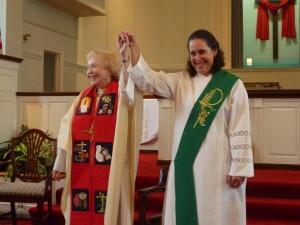By Wayne Besen
If there is one thing that irks me, it is having the Roman Catholic Church preach to me about sexual morality. It is a religious sect led by a virulently homophobic Pope that goes out of its way to trash my family. Yet, my family hasn’t spent a cent defending itself against nonexistent charges of child rape, while the Vatican has spent $2.5 billion on legal fees, prevention programs, and settlements relating to the sexual abuse of minors.
 Exactly why should I listen to what these “holy” men have to say? I’ve been out of the closet for twenty-four years, during which time I worked in the center of the LGBT movement, but can’t think of a single friend or colleague arrested for child molestation. None of the people I associate with have shielded, shuffled, or offered severance packages to pedophiles to protect the institutions that they work for. But such obscene behavior is precisely what the Vatican did, all the while turning my loved ones into scapegoats to obscure their criminality.
Exactly why should I listen to what these “holy” men have to say? I’ve been out of the closet for twenty-four years, during which time I worked in the center of the LGBT movement, but can’t think of a single friend or colleague arrested for child molestation. None of the people I associate with have shielded, shuffled, or offered severance packages to pedophiles to protect the institutions that they work for. But such obscene behavior is precisely what the Vatican did, all the while turning my loved ones into scapegoats to obscure their criminality.
The latest preoccupation of the Catholic Church, as well as their brethren in the ultra-Orthodox Jewish Community, is fiercely lobbying state legislatures to not change the statute of limitations for child sexual abuse cases.
“Even when you have the institution admitting they knew about the abuse, the perpetrator admitting that he did it, and corroborating evidence, if the statute of limitations has expired, there won’t be any justice,” Marci Hamilton, a professor at the Benjamin N. Cordozo School of Law at Yeshiva University, explained to the New York Times.
It seems the hierarchy is only interested in saving its own skin, instead of paying a price for those whose skin it violated. For a church built on a human sacrifice, there is scant evidence of noble virtues as the church lies and litigates against its victims.
Which brings us to a burning question: Why do liberal Catholics continue to support an intolerant, homophobic, misogynistic institution capable of covering up heinous crimes against children?
I’m not the only one asking this pertinent question. On June 1, the Freedom From Religion Foundation placed a full-page ad in USA Today headlined, “It’s Time to Quit The Catholic Church.”
According to the ad: “If you think you can change the church from within – get it to lighten up on birth control, gay rights, marriage equality, embryonic stem-cell research – you’re deluding yourself. By remaining a ‘good Catholic,’ you are doing ‘bad’ to women’s rights. You are an enabler. And it’s got to stop.”
New York Times columnist Bill Keller also urged moderate Catholics to find a new church: “Much as I wish I could encourage the discontented, the Catholics of open minds and open hearts, to stay put and fight the good fight, this is a lost cause…Summon your fortitude, and just go. If you are not getting the spiritual sustenance you need, if you are uneasy being part of an institution out of step with your conscience — then go.”
It does seem as if diehard liberal and moderate Catholics are not fighting so much as being beaten to a pulp by ideologues. If this were a boxing match, it would have been stopped many rounds ago. Indeed, attacks from the right have become so extreme that the Church is even going after American nuns. If nuns aren’t Catholic enough for these fanatics, liberal Catholics sure aren’t going to be embraced any time soon.
This whole debate reminds me of when gay people from conservative backgrounds complain to me that they can’t come out because of the environment in which they were raised. One says, “I grew up in a traditional Chinese household, so I can’t tell my parents.” While another person says, “I grew up in a Pentecostal family, so I can’t tell anyone.” And yet another proclaims, “You wouldn’t understand, it’s not that easy coming out because my parents are from a rural area.”
Everybody has an excuse or explanation, and, no, it’s never easy to come out – but at the same time, it really is a simple process. Saying “I’m gay” works like a charm every time and frees a person to be their authentic self.
Similarly, it may be incredibly difficult to leave the Catholic Church. But, it is also as easy as going to a computer search engine and typing “church” or speaking into your iPhone, “Siri, find me a church.” Within moments dozens of alternatives will pop up – many of which are more concerned with spirituality than the statute of limitations.
Are you tired of being treated like an abused dog by the Catholic Church? Then drop the dogma and quit. After all, they quit you, your family, and your moderate belief system a long time ago. Exit, don’t enable.
Complete Article HERE!




